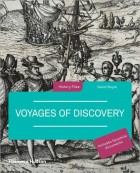Thames & Hudson, $24.95, 144 pages
David Boyle’s Voyages of Discovery is a readily accessible text about the early days of European exploration. It is beautifully illustrated, and contains a packet of reproduced primary source materials, such as an excerpt from Captain James Cook’s diary, and a 17th century map of the southern hemisphere. While many texts have been produced that tell the story of these voyages from the dominant European perspective, Boyle’s Voyages of Discovery succeeds in providing multiple points of view. Additionally, Boyle discusses the lesser known voyages of the Chinese explorers, although China only sent explorers for a few short years, and their discoveries were minimized by the prevailing domestic politics at the time, they were still quite important.
The lion’s share of the text discusses the period between 1450, and the importance of King Henry the Navigator, and the Portuguese efforts to traverse the Cape of Good Hope, through Ferdinand Magellan’s circumnavigation of the globe in 1527. There are further chapters that discuss the effects of the Conquistadors in the Americas, the search for the Northwest Passage, and the south seas journeys of Captain Cook in the middle of the 18th century.
This book is smaller than most textbooks, but it’s very sturdy, with an excellent, well cross-referenced index, and chronology of events. This is an ideal gift for the armchair historian, or general reader who is fascinated by the age of discovery. This text could easily be used within an AP World History classroom.
Reviewed by Brad Wright

